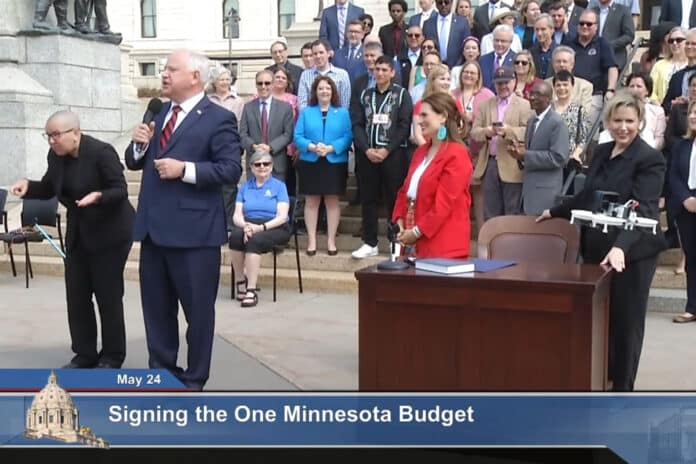
If the drones buzzing overhead and around the rostrum and the utterances of emphatic slogans such as “hope over fear,” and “inclusion over exclusion” gave an end-of-session bill signing ceremony the look and feel of a political rally, well, that’s because it was.
During his “One Minnesota Budget” victory lap press conference outside the Capitol steps on Wednesday, Gov. Tim Walz told an audience of mostly DFL legislators, staff and activists that the 2023 legislative session will be remembered as historic — not just because it signaled a 38 percent increase in state spending from one biennium to the next, but because the DFL “trifecta” held together in its approval of nearly every major legislative goal it set out to accomplish.
“Remember those at the beginning of session told us ‘they will never hold a majority of one together,'” Walz said as he was flanked by DFL legislative leaders and constitutional officers nodding and smiling as he recounted their legislative accomplishments. “’They will never do the things to protect our reproductive rights, to protect our trans children, to protect our environment, to make sure we have a more inclusive economy.’ They told us that wouldn’t happen. Don’t tell them that couldn’t happen, because they just showed you it can.”
Be it the Paid Family and Medical Leave Act, recreational marijuana legalization, the “Trans Refuge” bill, a public safety bill that featured two new gun control restrictions, or a transportation bill that included more than $1 billion in new sales taxes and delivery fees — the Democrats overcame their doubters and held together to accomplish the “One Minnesota” agenda with their six-seat majority in the House and one-seat majority in the Senate, Walz said.
“More than 2.5 million people last November showed up and cast votes,” Walz said. “They made a choice — they chose hope over fear. They chose inclusion over exclusion. They chose personal freedoms over totalitarian dictates from government. They chose science over conspiracy. And above all else, they chose action over gridlock.”
At the Wednesday signing ceremony, Walz affixed his signature to a dozen bills that passed in the last days of the legislative session that represent a major portion of a $72 billion state budget Democrats were able to pass, much to the chagrin of their Republican colleagues in both chambers.
Those bills Walz signed into law this week include a $2.2 billion increase in K-12 funding, a higher education bill highlighted by a provision that funds free college tuition to students enrolled in public Minnesota schools whose families make less than $80,000 a year, and a health and human services bill that removes several abortion restrictions that were previously state law.
Walz also signed a tax bill and child and families legislation that will create about $1.5 billion in new means-tested child tax credits. The tax bill also includes rebate checks that were less than promised by Walz on the campaign trail last fall and even at the beginning of this session.
DFL leaders agreed in the late hours of session on tax rebate checks that were highly politicized throughout the 2022 campaign. Their final agreement is means tested, and will send $260 to single filers who make under $75,000 a year and $520 to joint filers making under $150,000 a year. An additional $260 would be sent to families per household dependent, capped at three children and means tested at $150,000.
Republicans have criticized the DFL’s willingness throughout the session to spend all of the $17.5 billion surplus and create $9.5 billion in tax increases, weighed against a rather paltry $260 per person rebate check for only about half of Minnesota taxpayers.
“[Democrats] didn’t send you the $2,000 like they said they were going to do when they were asking for your vote,” said Rep. Kurt Daudt, R-Crown, on Monday during a debate on a $1.7 billion bonding bill on the House floor. “They are putting $260 in this pocket, and taking $3,500 out of this pocket. Nobody’s going to be fooled” when those rebate checks are distributed, Daudt continued.
While Senate Minority Leader Mark Johnson, R-East Grand Forks, told media following the end of session Monday night that he was glad both parties could work together to get $300 million in emergency funding to nursing homes and approve a bonding bill that was carried over from the 2022 session, he said he was extremely disappointed in all the other areas of the budget, in what he characterized as one of the more partisan legislative sessions.
“One of the hopes I had when we started out this session was that [Senate Republicans] are nearly 50 percent of the body,” Johnson said. “So I figured we would have some really good bipartisan work going forward; that didn’t happen.”
“You look at the burden this (budget) is going to be putting on Minnesota families and businesses and you wonder, ‘Is this going to be sustainable in the long term?’’’ Johnson said. “That’s something we are going to watch going forward.”
But back at the Wednesday “One Minnesota Budget” celebration, Lt. Gov. Peggy Flanagan gushed with emotion as she played to the crowd of a few hundred DFLers in attendance, and said, “I love my job.”
“If people have begun to lose faith in democracy, look to Minnesota,” Flanagan said. “When we show up and we vote with our values, when we say we are going to take care of each other; when everyone is in and no one is out, it matters. And these are the results you can get.”
Hank Long
Hank Long is a journalism and communications professional whose writing career includes coverage of the Minnesota legislature, city and county governments and the commercial real estate industry. Hank received his undergraduate degree at the University of Minnesota, where he studied journalism, and his law degree at the University of St. Thomas. The Minnesota native lives in the Twin Cities with his wife and four children. His dream is to be around when the Vikings win the Super Bowl.















